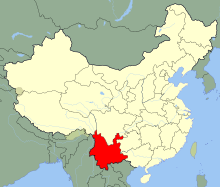Yunnan - Simple English Wikipedia, the free encyclopedia

Yunnan (simplified Chinese: 云南; traditional Chinese: 雲南; ![]() listen) is a province in southwest province of the People's Republic of China. The area of Yunnan Province is 394,100 km2 (152,200 sq mi). It spans approximately 394,000 square kilometres (152,000 sq mi) and has a population of 45.7 million (2009). The capital of the province is Kunming. The province borders Vietnam, Laos and Burma.
listen) is a province in southwest province of the People's Republic of China. The area of Yunnan Province is 394,100 km2 (152,200 sq mi). It spans approximately 394,000 square kilometres (152,000 sq mi) and has a population of 45.7 million (2009). The capital of the province is Kunming. The province borders Vietnam, Laos and Burma.
Political divisions
[change | change source]Yunnan Province is divided into eight municipalities (地级市) and eight autonomous prefectures (自治州).
- Kunming Municipality (昆明市) - Provincial capital
- Qujing Municipality (曲靖市)
- Yuxi Municipality (玉溪市)
- Baoshan Municipality (保山市)
- Zhaotong Municipality (昭通市)
- Lijiang Municipality (丽江市)
- Pu'er Municipality (普洱市)
- Lincang Municipality (临沧市)
- Dehong
- Nujiang
- Diqing
- Dali
- Chuxiong
- Honghe
- Wenshan
- Xishuangbanna
Culture
[change | change source]Yunnan's cultural life is one of remarkable diversity. It is famous for ethnic minority groups, Yuanmou Human archaeological findings, ancient Tea Horse Road legends, Puer teas and Yunnan Baiyao medicines.
Tourism
[change | change source]- Dali, the historic center of the Nanzhao and Dali kingdoms.
- Chuxiong, the first stop on the way to Dali and Lijiang. Home of the Yi ethnic minority and their respective ancient town.
- Jinghong, the center and prefectural capital of the Xishuangbanna Dai minority autonomous prefecture.
- Lijiang, a Naxi minority city. It has been a UNESCO World Heritage Site since 1997.[1][2]
- Xamgyi'nyilha County (also known as Shangri-La and formerly Zhongdian), an ethnic Tibetan township and county set high in Yunnan's northwestern mountains.
- Shilin (Stone Forest), a series of karst outcrops east of Kunming.
- Yuanyang, a Hani minority settlement with vast rice-terraced mountains.
- Xishuangbanna, a national scenic resort, noted for its natural and cultural attractions.
References
[change | change source]- ↑ "中国的世界遗产名单". 中华人民共和国教育部.
- ↑ "Old Town of Lijiang". whc.unesco.org.
Other websites
[change | change source]


 French
French Deutsch
Deutsch